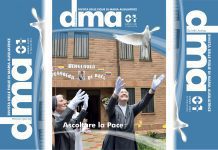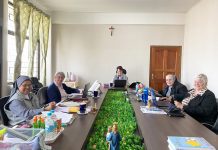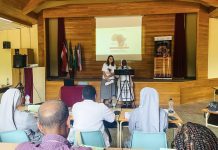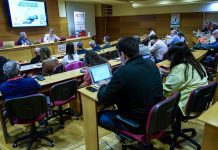Konstancin Jeziorna (Poland). On May 26-30, 2019, in the Center for Missionary Animation of the Pallotine Fathers, the Meeting of Mother and some Sisters of the General Council with the Provincial Councils of Central and Eastern Europe took place.
The meeting was attended by: Mother Yvonne Reungoat, Sr. Chiara Cazzuola (Vicar general), Sr. Vilma Tallone (General Treasurer), Sr. Maria Nieves Reboso (Councilor for Formation), Sr. Runita Borja (Councilor for Youth Ministry), Sr. Alaide Deretti (Councilor for the Missions), Sr. Paola Battagliola (Visiting Councilor), Sr. Mira Peče (Visiting Councilor). Representatives of the Provincial Councils were also present: Czech Republic and Lithuania (CE), Preprovince of Eastern Europe and Georgia (EEG), Southern Italy and Albania (IMR), Italy Triveneta and Hungary (ITV), Slovenia and Croatia (SLC), Slovakia (SLK), Poland: Mary Help of Christians Province (PLA), Province of Our Lady of Jasna Góra (PLJ).
The purpose of the meeting was to reflect on the process of consolidation of the charism and on the revitalization of educational works for new apostolic vitality and a renewed sense of belonging and identification with Salesian spirituality.
The reflection started with sharing experiences of the time of Communism in Europe after the Second World War, held by the invited speakers: Prof. Lodovica Maria Zanet (Postulation Collaborator for the Canonizations in the Salesian Family) and of Fr. Michal Vojtas SDB (from Slovakia, Professor at UPS).
The presentation by Prof. Zanet on the theme: Communism: historical-critical genesis and forms of alienation of the human-Paths for reflection made it possible to know the characteristics of Communism perceived by the inhabitants of Western Europe and the different way of experiencing this ideology in the East and West of Europe. The speaker presented the historical-critical genesis of Communism, the main ideas, their assimilation and development, the dramatic influence on the human person, with particular attention to the way in which Communism conditioned the perception of oneself, of relationships with others and with the world. A precious completion of the presentation was given by the examples of Salesian saints who lived the charism under the conditions of the communist regime.
The report by Fr. Vojtas on the subject of Salesian charism and (post) communism had as its objective the facilitation of the historical, geographical, political, cultural-communicative aspects.
The Eucharist was presided over by the Provincial of Warszawa Fr. Andrzej Wujek and concelebrated by his vicar Fr. Przemysław Solarski and Fr. Michal Vojtas on the first day, and then there were the sharing of ideas in groups, the assembly, the good nights, the interventions of the Mother and the Sisters of the Council.
A particular moment was the presentation of the post-war history of individual nations, both in the form of an exhibition and with the sisters’ reports and multimedia presentations. An exceptional fidelity to the charism, heroism, and creativity emerged in the search for ways of acting in life-threatening conditions, the risk of loss of freedom, of obstructionism, and marginalization.
At the end of the meeting the work of the Provincial Councils took place: starting from the challenges that emerged from the interventions of the speakers and from the presentations of the individual Provinces and Preprovinces, a priority was chosen around some generative nuclei (formation, mission, community, animation- government), to continue the processes in view of the vitality of the charism, taking into account the history, geography, experience of pluriculturalism, dynamism of development, different conceptions of communism, and diversified strategies in the face of communism.
The Provinces presented the chosen priorities and everything concluded with a solemn celebration of entrustment to Mary Most Holy.
The experience of this Community has been enriched by meeting with the novices and the young women in PAG of the PLJ Province, by the brief excursion to Warszawa in the footsteps of modern history, and by the evening of cultures during which the beauty of folklore could be admired of the peoples of Central and Eastern Europe and the appreciation of national traditions and values.



















